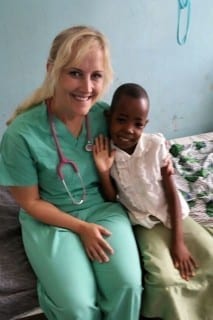As a high school student, Catherine “CJ” Koozer worked at Camp Courageous, a facility near Monticello, IA, for children and adults with disabilities. Last year, she joined pediatricians from Des Moines’ Blank Children’s Hospital for 10 days of treating poor children in the Singida region of Tanzania, one of the nation’s poorest areas. She envisions serving children with special needs as her future career.
In other words, Koozer wants to practice medicine with deep compassion for people who truly need it. But don’t think she’s just a softie: She knows money and policy have a huge impact on people’s health in addition to the type of care they receive. That’s why she chose to earn a master’s degree in health care administration (M.H.A.) at DMU in addition to her D.O. degree. She is among more than 30 DMU students who are pursuing both clinical and nonclinical degrees.
Koozer, who’s set to complete both her DMU degrees this year, gained insights on the nonclinical side of health care after receiving a Harry S. Truman Scholarship as an undergraduate at Nebraska Wesleyan University. That landed her an internship with the U.S. State Department and then a full-time position with the Department of Health and Human Services Office of Rural Health Policy. At the time, development of and debate over the Affordable Care Act were under way.
“I was seeing things happening mostly because of insurance, money and business decisions,” she says. “I wish it wasn’t like that, but if I’m trying to become an effective advocate for patients, I need to understand that business side.”

Her practice aspirations were affirmed by rotations with Nate Noble, D.O.’04, a board-certified developmental pediatrician at Blank Children’s Hospital, and Fred Klingbeil, M.D., a board-certified pediatric physiatrist — the only one in Iowa — with ChildServe, a Des Moines organization that provides residential and community services to more than 2,500 children with special needs and their families each year.
“ChildServe uses an integrated medical home model, which is ideal,” Koozer says. “That is the pinnacle for me of what health care should be. Dr. Klingbeil is an advocate for patients and a medical care manager, which makes sense for kids with very high needs. That also links the philosophies of health care administration and medicine.”
Koozer hopes she can help shape health care in addition to serving patients. “In Washington, I worked with both policymakers and clinicians who were involved as policymakers. That’s the type of physician I want to be,” she says. “Particularly at the state level, there’s a huge demand for people interested in making policies and advocating for patients. It’s incredibly important for physicians to be involved.”
She believes her DMU degrees will help equip her to do so. “I want to do everything I can for patients,” she says. “Now that I know the profession I want to go into, I can say DMU has prepared me to be a pediatric care provider, advocate and leader.”


